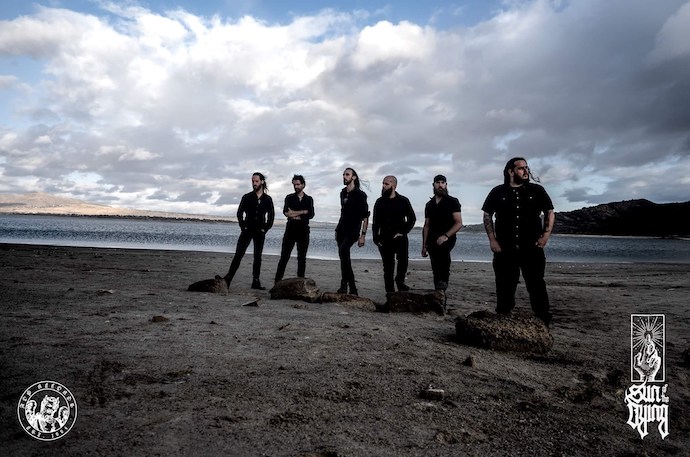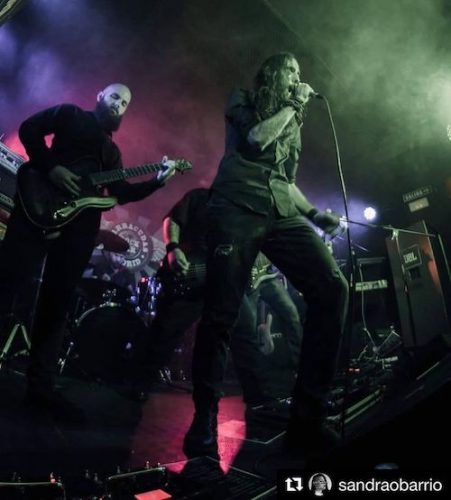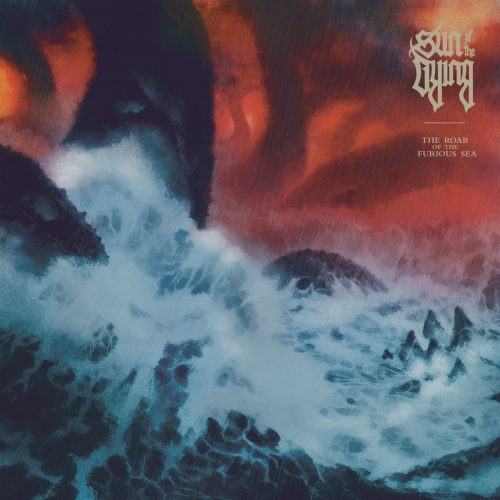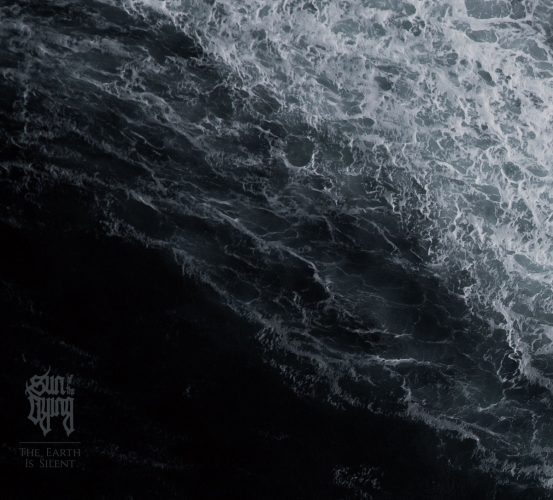
(Comrade Aleks has had a very busy fall, and as a consequence we have many of his interviews lined up to appear between now and the end of 2019, including this discussion with members of the Spanish doom/death band Sun of the Dying.)\
Here we have Madrid-based Sun Of The Dying, a band that has developed shortly from a quite depressive yet melodic doom death metal of their debut album The Roar Of The Furious Sea (2017) to the richer melancholic and atmospheric themes of their brand new album. The Earth Is Silent saw the light of day on the 29th of November through Art Of Propaganda, and the band sounds really updated, and that’s not only because of a new vocalist on board.
It’s something rare, but almost the whole band took part in this interview. Let me introduce you to – Daniel Fernández Casuso (guitars), Eduardo Guilló (vocals), David Muñoz (keyboards), Jose Yuste (bass), and Roberto Rayo (guitars). I don’t know why Sun Of The Dying’s drummer didn’t take part into this — I hope he’s fine there.
Hi gents! Sun Of The Dying’s second album The Earth Is Silent is just appeared on Art Of Propaganda. What do you feel? Is it a relief or rather satisfaction of a job well done?
Daniel: It’s both, a relief for finding such a good partner, and a satisfaction, because for us it is a big achievement working with a label of the category of AOP Records.
When the album was recorded, we knocked on several labels’ doors, and the interest of AOP was a pleasant surprise. Then we started to talk with them, and we exchanged ideas and impressions. The feeling was so good, that we agreed to collaborate immediately.

Daniel, you remain Sun Of The Dying’s only original member. Can you say that this band is your own vision? Are your band mates free to offer their ideas, or did you have a strict concept for The Earth Is Silent?
Daniel: The band was born as a side project while I was playing bass at Apocynthion, and two goals were clear: playing guitar again, and making music that stands for the inherent feelings of despair, woe, and sorrow on a personal way. Of course I was satisfied with my other group, but playing again in a doom metal band was pending, and expressing and sharing those feelings was almost a necessity for me.
Then, when more members were added, they brought new nuances about the same ideas. Today Sun of The Dying is a band with its own identity, a whole, it is the sum of those who have been and those who are.
Considering the previous question — how much of the original Sun Of The Dying is left in the new album due to all the members’ rotations?
Daniel: The essence is quite similar, but everything is more complex. There are more genre influences, musical variety, more developed melodies and arrangements… This is not just because of the rotation of the members, but because we wanted and could do things that way.
Who was the lyricist for The Roar Of The Furious Sea? And who wrote the texts for The Earth Is Silent? Did you want to keep a similar concept and do you feel it was effectively embodied in the new songs?
Eduardo: The lyrics of The Roar of the Furious Sea were written by Lavín Uruksoth, the previous singer, but in The Earth is Silent David (keyboards) and I did that work. For this LP we wanted to share our own tragic experiences and also tribute to writers we admire, like Dylan Thomas or H.P. Lovecraft. I think that we have continued with the concept of our previous CD, but taking another step in matters of structure and emotional expressiveness.
Dylan Thomas and H.P. Lovecraft? I didn’t expect it. Do you mean the lyrics are influenced by these authors? Or did you borrow parts of their texts?
David: Both. Our lyrics are of course inspired by the things we like, by the art we consume. In this way, some of our texts speak about books we love, as in ‘When The Morning Came’, heavily influenced by Cormac McCarthy’s The Road or ‘A Dying Light’, based in Do Not Go Gentle Into That Good Night by Dylan Thomas. ‘Monolith’ is not only based on At The Mountains Of Madness by Lovecraft, the spoken part at the end is taken from the book.
There were three guitarists in the time you were recording The Roar Of The Furious Sea – Daniel, Roberto, and Cnoir. How did you share your duties? And did you want to repeat this experience in the new songs?
Daniel: Metallum was wrong: CNoir was my mate with guitars just before we started to record The Roar Of The Furious Sea. Roberto Rayo performed his parts during the recording. On The Earth Is Silent the duties are pretty similar, we usually discuss which phrase, chords, or melody we like more, or what is more adequate to our playing style.
I see that Jose Yuste (bass) and Eduardo Guillo (vocals) have joined you in 2017. Did you have time to build a kind of team spirit to successfully collaborate in the studio?
Daniel: Too much! Finding musicians like Yuste or Eduardo is not easy. Technically they are formidable, so in a short time they contributed a lot to the sound of the group. But as band members they have been even better. In SoTD we have the feeling not only of a “band” or “group of friends”. We spent a lot of time together, playing, on tour, or drinking beer, so we’re like a small family.
J. Yuste (bass): It was so easy to love this bunch of Mot*******rs!!!. Seriously, from the beginning I have been very comfortable, we tend to do things simple and we have very clear ideas, which makes it very easy to form a team spirit. Besides they are also lovely and helpful people.

There are touching melancholic jazz influences in the ‘Monolith’ song. How did you come to this idea? Was it an improvisation or did you want to experiment a bit before entering the studio?
Roberto: ‘Monolith’ started from a little riff that we came up with in one of our rehearsals. Back home, I developed it and it eventually ended being the main riff of a full song. I brought that song to our rehearsal room and we played it all together. It worked almost completely, except for some parts. For example, the ending section was more like a post-metal part, very repetitive. So we played the chord progression, and then David came to the idea of playing a little improvised piano solo over it. We liked it a lot, and added a more jazzy feeling to it. That song became ‘Monolith’.
That’s really good — it sounds very natural and refreshing. Do you see there’s space for experiments in Sun Of The Dying in the future?
David: We follow the Doom Metal path, and we are true worshippers of the genre, but of course we can take more elements of other kinds of music to make our songs a little bit richer.
Would you pick up some other songs from the album for which you allowed yourself a new approach? Is it important for you as a songwriter to improve your skill with new compositions, or do you have your own working formula and that’s enough to express yourself?
Daniel: Well, the songs themselves are made by all the members of the group. In our way of working someone brings to the rehearsal an idea, four chords, or almost the whole song. Then together we try to shape it. So we usually reach a point where complicating the song more does not bring anything new, and that’s the point to skip to the next song.
Personally, I like to challenge myself to do new or more complex things. However my creed is: if it’s simple and sounds good, it sounds good twice.
Those jazz influences can be also found on ‘When the Morning Came’, our second single. Overall, we are true worshippers of the Doom Metal sound, but we are not afraid to add different elements if they come in a natural way. We love to blend it with orchestrations, some prog parts, and even a folkie vibe, although that one is not very noticeable on this album.
Which doom bands inspire you nowadays? And which ones were your first encounter with the doom scene?
David: Some of the Doom Metal giants are still in good shape. My Dying Bride and Paradise Lost are releasing awesome albums, and the northern European scene is still amazing, with bands as Swallow The Sun, Hallatar, Shape Of Despair, Saturnus… Maybe it’s the best time for Doom Metal, and even relatively new bands are achieving the recognition they deserve. It is amazing to see awesome acts as Hamferd, Clouds, or our fellow countrymen Evadne or Helevorn having important slots in venues and festivals all around the continent.
By the way, what kind of feelings or ideas do you express through Sun Of The Dying? Do you feel you do this effectively enough?
Daniel: Each song has a different theme, although others are common: loneliness, sadness, anger, emotion… I think we do our best. It’s hard when you want to express feelings to other people. In music it depends on the empathy of the listener and your ability to communicate with the music. When you get off the stage after a concert and talk to the audience, or after a release like the one we have now, and people tell you what they have experienced and felt, I think it is well done.
How often do you get such straight feedback from people? Mostly on gigs, or do people write you emails as well?
Daniel: The best time is after a concert, getting off the stage… People know who you are, and what you portray, and they talk about what the concert has meant for them. What they have felt, what you have reminded them of, and in general how they have happened to experience the music.
Sometimes someone sends a message through social networks. We fuck*ng love it. Now bands and fans can connect easily. It’s awesome.

I’ve already seen very enthusiastic feedback on The Earth Is Silent. Do you share this enthusiasm of critics? There are really many doom bands nowadays, and I think it’s hard to stand out as new releases appear every month.
Daniel: The truth is that we are a little overwhelmed by the good reception that the album is having. We are anxious for the release so that it reaches more people and see what reception it has. Now there are a lot of great releases, I think it’s a good time for Doom Metal and we love being part of it.
Okay, then I wish Sun Of The Dying will keep on shining further! And it seems I didn’t ask you if you’re going to tour in order to support the release? Will you?
Daniel: Of course, we’re considering some concerts in our land, and some dates outside of Spain, but at this moment we haven’t any date confirmed yet. So if any road manager is reading this, please, contact us!
